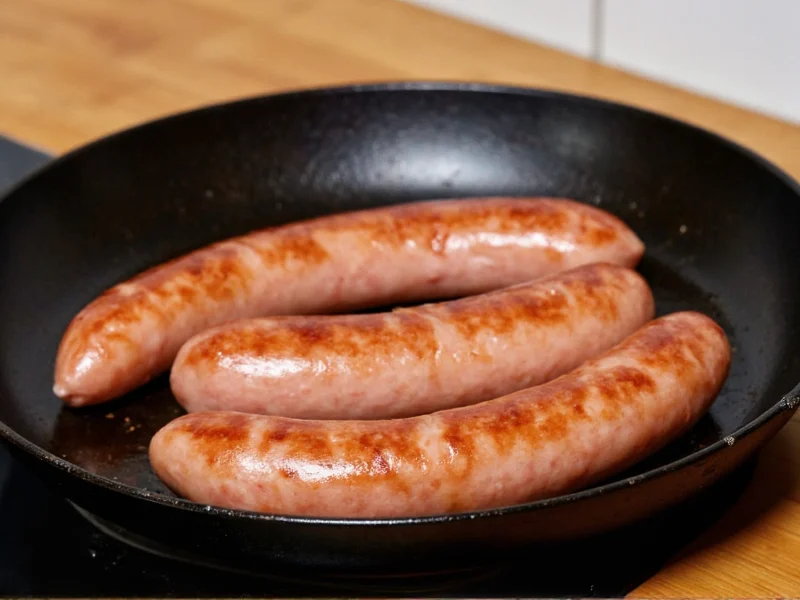Cooking sausage on the stovetop delivers restaurant-quality results with minimal equipment. This versatile method works for nearly all sausage varieties, from bratwurst to Italian links, and gives you precise control over browning and doneness. Unlike grilling or baking, stovetop cooking allows you to render fat gradually while developing a perfect golden-brown crust.
Understanding Sausage Types for Stovetop Cooking
Not all sausages behave the same way on the stove. Recognizing your sausage type prevents common cooking mistakes:
| Sausage Type | Cooking Approach | Special Considerations |
|---|---|---|
| Fresh raw sausages (pork, beef, chicken) | Cook completely from raw state | Requires full cooking to safe internal temperature |
| Pre-cooked/smoked sausages | Heat through gently | Easily overcooked; needs shorter time |
| Fragile casings (liver, blood) | Very gentle heat | Prone to bursting; requires careful temperature control |
Essential Preparation Steps
Proper preparation ensures even cooking and prevents common issues like bursting or sticking:
- Temperature equilibrium: Remove sausages from refrigerator 20 minutes before cooking to reduce temperature shock
- Dry surface: Pat sausages thoroughly with paper towels to promote browning
- Pan selection: Use a heavy-bottomed skillet (cast iron or stainless steel) for even heat distribution
- No oil needed: Most sausages contain enough fat to cook without additional oil
Step-by-Step Stovetop Cooking Method
Follow these precise steps for perfectly cooked sausage every time:
- Place sausages in a cold, dry skillet - don't crowd the pan (cook in batches if necessary)
- Set burner to medium heat (approximately 325-350°F / 163-177°C)
- As sausages heat, fat will render - occasionally spoon excess fat from the pan
- Turn sausages every 2-3 minutes using tongs for even browning
- Cook for 12-15 minutes total, or until deep golden brown on all sides
- Verify doneness with an instant-read thermometer inserted sideways into the thickest part
- Rest sausages for 5 minutes before serving to redistribute juices
Troubleshooting Common Stovetop Sausage Problems
Address these frequent issues with professional solutions:
Sausage Bursting
This happens when internal pressure builds faster than the casing can handle. Prevent it by:
- Starting from cold pan rather than hot
- Maintaining medium (not high) heat throughout cooking
- Never piercing the casing with a fork
- Choosing high-quality sausages with natural casings
Uneven Browning
If your sausage browns unevenly, try these fixes:
- Rotate sausages a quarter turn each time you flip them
- Use a ridged grill pan for defined sear marks
- Ensure consistent sausage thickness by selecting similar-sized links
Sticking to the Pan
Prevent sticking with these techniques:
- Use sufficient initial cooking time before first flip (4-5 minutes)
- Choose proper cookware (well-seasoned cast iron or quality non-stick)
- Ensure sausages are completely dry before cooking
- Never force sausages that haven't naturally released from the pan
Advanced Techniques for Perfect Results
Elevate your stovetop sausage cooking with these professional methods:
The Water Poach Method
For particularly delicate sausages:
- Add 1/4 inch of water to the pan with sausages
- Cover and simmer over medium-low heat for 10 minutes
- Remove lid and continue cooking until water evaporates and sausages brown
This gentle approach ensures thorough cooking without bursting.
Finishing with Butter Basting
For restaurant-quality flavor:
- After initial browning, reduce heat to medium-low
- Add 2 tablespoons of butter, crushed garlic, and fresh herbs to the pan
- Tilt pan and spoon melted butter continuously over sausages for 2-3 minutes
Safety Considerations When Cooking Sausage
Food safety is critical when preparing meat products:
- Always use a food thermometer to verify internal temperature
- Pork sausages require 160°F (71°C), poultry sausages need 165°F (74°C)
- Clean all surfaces that contacted raw sausage with hot, soapy water
- Never place cooked sausage back on the plate that held raw meat
- Consume cooked sausage within 2 hours or refrigerate promptly
Serving Suggestions and Pairings
Complete your sausage meal with these complementary options:
- Classic pairing: Served with sauerkraut and mustard over potato pancakes
- Breakfast option: With eggs, peppers, and onions for a hearty morning meal
- Italian style: Sliced and added to pasta sauces or on crusty bread with peppers
- Brunch presentation: Sliced diagonally and fanned around a platter with dipping sauces











 浙公网安备
33010002000092号
浙公网安备
33010002000092号 浙B2-20120091-4
浙B2-20120091-4